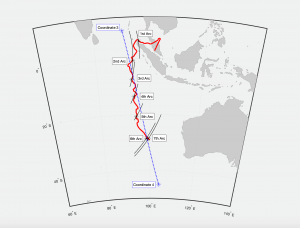A new exclusive report suggests MH150 not Mh370 was the intended target flight for hijacking
Mr Godfrey says that the alignment of Captain Zaharie Shah’s home simulator flight path with the Weak Signal Propagation Reporter (WSPR) flight path analysis is no coincidence. That revolutionary new tracking has led to a new location of MH370.
Mr Godfrey told AirlineRatings.com that “the flight path from Captain Zaharie Shah’s home flight simulator passes right through the WSPR-defined crash location. The coordinates from Captain Zaharie Shah’s home simulator flight path were recovered by the Royal Malaysian Police during their investigation into the disappearance of MH370.
“There are two key coordinates on the home simulator flight path, one at the turn south in the vicinity of the Andaman Islands at around 10.2°N 90.2°E and the other at fuel exhaustion at around 45.1°S 104.1°E.
“The major difference between Captain Zaharie Shah’s home simulator flight path and the WSPR flight path analysis (below) is that the flight path is much longer in the home simulator. The reason for the longer path is the amount of fuel assumed during the simulation.
“The flight path from Captain Zaharie Shah’s home flight simulation was run on 2nd February 2014, with a starting fuel amount of 68,523.8 kg fuel on board. Capt. Zaharie Shah flew the Malaysian Airlines System (MAS) flight MH150 from Kuala Lumpur to Jeddah on 4th February 2014 and had an estimated 68,450 kg of fuel onboard following the MAS standard fuel planning practice. It is no coincidence that the two fuel amounts in the simulator and in the real world are almost identical.
“This raises the question: Was the original target actually MH150 and not MH370? If the initial plan was to hijack flight MH150, then it obviously did not happen. A possible reason is that there were two sets of crew on flight MH150 making it more risky to divert and hijack. Was MH370 then chosen instead, although there was less fuel, but because there was no extra flight crew on board?
“Flight MH370 had 49,100 kg of fuel at take off on 7th March 2014 according to the official flight plan and load sheet. Fuel exhaustion resulting in a dual flame out of both engines occurred on 8th March 2014 at around 00:17:30 UTC. The fuel range following diversion into the Southern Indian Ocean will be much shorter than would have been the case for MH150 with the estimated additional 19,350 kg of fuel.”
Mr Godfrey added that “MH370 with 239 people on board remains the worst loss of life in aviation history as a result of a diversion and hijacking since the 911 multiple hijackings on 11th September 2001.
“MH370 is the worst aviation incident in the history of commercial aviation of all 447 aircraft listed as missing or as cause undetermined in the Aviation Safety Network accident database, which goes back to 1919.
“A diversion and hijacking of MH150 to Jeddah would have been even worse news for a mainly Muslim country like Malaysia.”
Geoffrey Thomas
Airline Ratings Pty Ltd
+61 417 936 610
email us here
Visit us on social media:
Facebook
Twitter
LinkedIn
YouTube



